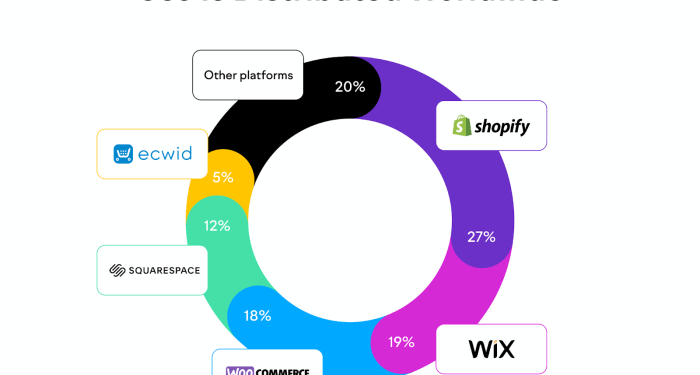Exploring the dynamic landscape of SMB growth through the lens of ecommerce platforms sheds light on the transformative power they hold. As small and medium-sized businesses strive to carve their path in the competitive market, these platforms emerge as indispensable allies, fueling expansion and innovation at every turn.
With a myriad of features and tools at their disposal, SMBs can harness the potential of ecommerce platforms to elevate their presence, compete with industry giants, and thrive in the digital realm.
Importance of Ecommerce Platforms for SMB Growth
Ecommerce platforms play a crucial role in enabling small and medium-sized businesses (SMBs) to reach a wider audience and achieve significant growth in today's digital landscape.
Enhanced Reach and Visibility
By leveraging ecommerce platforms, SMBs can showcase their products or services to a global audience, breaking down geographical barriers and expanding their customer base.
Competitive Edge Against Larger Corporations
Ecommerce platforms provide SMBs with the tools and resources needed to compete with larger corporations in the online marketplace. These platforms offer customizable solutions, marketing tools, and analytics that empower SMBs to optimize their operations and stand out from the competition.
Examples of Popular Ecommerce Platforms
- Shopify: Shopify has empowered countless SMBs to create and manage their online stores efficiently, offering a user-friendly interface and a wide range of integrations for seamless operations.
- WooCommerce: As a plugin for WordPress, WooCommerce has enabled SMBs to easily set up and customize their online stores, with features like inventory management and secure payment gateways.
- BigCommerce: BigCommerce is a robust ecommerce platform that provides SMBs with advanced tools for scaling their online businesses, including optimization, multi-channel selling, and analytics.
Features and Tools Offered by Ecommerce Platforms
Ecommerce platforms offer a wide range of features and tools to help small and medium-sized businesses (SMBs) grow their online presence and increase sales. From website builders to inventory management systems, these platforms provide essential tools for SMBs to succeed in the competitive online market.
Website Builders
Website builders are key features offered by ecommerce platforms that allow SMBs to create and customize their online storefronts without the need for coding knowledge. With user-friendly interfaces and drag-and-drop functionalities, SMBs can design professional-looking websites to attract customers and showcase their products effectively.
Inventory Management
Efficient inventory management is crucial for SMBs to keep track of their products, stock levels, and orders. Ecommerce platforms provide tools that enable SMBs to manage their inventory effectively, set up automatic alerts for low stock, and streamline the fulfillment process to ensure timely deliveries to customers.
Marketing Integrations
Marketing integrations offered by ecommerce platforms help SMBs reach a wider audience and drive traffic to their online stores. These integrations include email marketing tools, social media integrations, and features that enable SMBs to create targeted campaigns, engage with customers, and improve their online visibility.
Comparing Ecommerce Platforms
When choosing an ecommerce platform, SMBs should consider their specific needs and goals to find the best fit. For example, platforms like Shopify offer a wide range of customizable themes and easy-to-use interface, while BigCommerce provides advanced tools and robust analytics for data-driven decision-making.
Each platform has unique features that cater to different SMB requirements.
Success Stories
Many SMBs have leveraged specific features offered by ecommerce platforms to achieve significant growth and success. For instance, a small boutique clothing store used the social media integration tools provided by a platform to increase their online visibility and attract new customers, leading to a substantial increase in sales.
These success stories highlight the importance of utilizing the features and tools offered by ecommerce platforms to drive SMB growth.
Customization and Scalability of Ecommerce Platforms
Small and medium-sized businesses (SMBs) often have unique requirements when it comes to their online presence. Ecommerce platforms play a crucial role in allowing these businesses to customize their websites to meet these specific needs.
Customization Options for SMBs
Many ecommerce platforms offer a wide range of customization options, allowing SMBs to tailor their online stores to reflect their brand identity and cater to their target audience. Some of the key customization features include:
- Customizable themes and templates to create a visually appealing website that aligns with the brand image.
- Flexible product catalog settings to showcase products in a way that resonates with customers.
- Personalization tools to create unique shopping experiences for each visitor based on their preferences and behavior.
Scalability for SMB Growth
Scalability is another essential aspect of ecommerce platforms that is crucial for SMBs looking to expand their online presence and accommodate growth over time. Ecommerce platforms offer scalability options such as:
- Ability to handle increased website traffic during peak seasons or promotional periods without compromising performance.
- Integration with third-party tools and plugins to add new features and functionalities as the business grows.
- Support for multiple sales channels, including mobile and social media, to reach a broader audience and drive sales.
Tips for Leveraging Customization and Scalability
To effectively leverage the customization and scalability features of ecommerce platforms, SMBs should:
- Regularly review and update their website to ensure it aligns with their brand identity and meets the evolving needs of their customers.
- Continuously monitor website performance and user feedback to identify areas for improvement and optimization.
- Invest in training or resources to maximize the use of customization and scalability features offered by the ecommerce platform.
Integration with Third-party Tools and Services
Integration with third-party tools and services is crucial for the growth of small and medium-sized businesses (SMBs) as it allows them to extend the functionality of their ecommerce platforms beyond the standard features.
Key Third-party Tools and Services
- Payment Gateways: Integrating with payment gateways like PayPal, Stripe, or Square enables secure online transactions, providing customers with various payment options.
- Shipping and Logistics Services: Integration with shipping carriers such as UPS, FedEx, or DHL helps SMBs automate shipping processes and provide real-time shipping rates to customers.
- Marketing Tools: Integrating with email marketing services like Mailchimp or social media platforms such as Facebook and Instagram allows SMBs to reach a wider audience and drive more traffic to their online stores.
These integrations enhance the overall shopping experience for customers, improve operational efficiency, and help SMBs stay competitive in the market.
Impact of Seamless Integrations
- Streamlining Operations: By integrating with third-party tools and services, SMBs can automate repetitive tasks, reduce manual errors, and save time, allowing them to focus on growing their business.
- Boosting Sales: Seamless integrations enable SMBs to offer a better shopping experience to customers, leading to increased customer satisfaction, repeat purchases, and ultimately, higher sales revenue.
Mobile Commerce and Omnichannel Presence
Mobile commerce and having an omnichannel presence are crucial for SMBs utilizing ecommerce platforms as they cater to the evolving consumer behavior. With the increasing reliance on mobile devices for shopping and the desire for a seamless shopping experience, SMBs need to optimize their mobile presence and offer a consistent experience across various sales channels.
Optimizing Mobile Shopping Experiences
Mobile optimization is key for SMBs to capitalize on the growing trend of mobile commerce. Strategies such as responsive design, fast loading times, and easy navigation are essential for providing a user-friendly mobile shopping experience.
Integrating Multiple Sales Channels
SMBs can benefit from integrating multiple sales channels, such as social media platforms, marketplaces, and physical stores, to reach a wider audience. By connecting these channels seamlessly, SMBs can enhance their brand visibility and attract more customers.
Benefits of Omnichannel Presence
Offering a seamless shopping experience across various devices and channels brings numerous benefits for SMB growth. It increases customer satisfaction, builds brand loyalty, and drives repeat purchases. Additionally, an omnichannel presence allows SMBs to gather valuable data on customer behavior and preferences, enabling them to tailor their marketing strategies effectively.
Data Analytics and Insights for SMB Decision-making

Data analytics and insights play a crucial role in helping small and medium-sized businesses (SMBs) make informed decisions that can drive growth and profitability. By leveraging the data provided by ecommerce platforms, SMBs can gain valuable insights into customer behavior, market trends, and performance metrics, enabling them to optimize their strategies and operations.
Utilizing Data Analytics for Marketing Strategies
- By analyzing customer purchase history and browsing behavior, SMBs can personalize marketing campaigns and promotions to target specific customer segments more effectively.
- Tracking key performance indicators (KPIs) such as conversion rates, customer acquisition costs, and customer lifetime value can help SMBs assess the effectiveness of their marketing efforts and make data-driven decisions to optimize their ROI.
- Using data analytics to monitor website traffic and user engagement can provide insights into customer preferences and behaviors, allowing SMBs to tailor their marketing messages and offerings accordingly.
Enhancing Customer Experiences with Data Insights
- By analyzing customer feedback, reviews, and support interactions, SMBs can identify pain points and areas for improvement in their products or services, leading to enhanced customer satisfaction and loyalty.
- Utilizing data analytics to track customer journey paths and touchpoints can help SMBs identify opportunities to streamline the purchasing process and provide a seamless shopping experience across all channels.
- Implementing A/B testing and multivariate analysis based on data insights can help SMBs optimize website design, product offerings, and pricing strategies to meet customer preferences and increase conversions.
Driving Growth and Profitability through Data-driven Insights
- By analyzing sales trends, inventory levels, and pricing strategies, SMBs can make informed decisions to optimize their product mix, pricing structure, and supply chain management for maximum profitability.
- Utilizing predictive analytics and forecasting models based on historical data can help SMBs anticipate market trends, demand fluctuations, and customer preferences, enabling them to proactively adjust their strategies and stay ahead of the competition.
- Monitoring key business metrics and financial performance indicators through data analytics can help SMBs identify opportunities for cost savings, revenue growth, and operational efficiency improvements, driving sustainable growth and long-term success.
Final Wrap-Up
In conclusion, the symbiotic relationship between SMBs and ecommerce platforms exemplifies a synergy that propels growth, fosters adaptability, and paves the way for sustained success. As businesses navigate the ever-evolving landscape of commerce, the role of these platforms as catalysts for growth remains unwavering and essential.
Essential FAQs
How can SMBs benefit from utilizing ecommerce platforms?
By leveraging ecommerce platforms, SMBs can reach a wider audience, compete effectively with larger corporations, and access a host of tools for streamlined operations and enhanced customer experiences.
What are some key features to look for in an ecommerce platform for SMB growth?
Important features include robust website builders, efficient inventory management systems, seamless marketing integrations, and scalability options to accommodate business expansion.
Why is mobile commerce crucial for SMBs on ecommerce platforms?
Mobile commerce enables SMBs to tap into a growing market segment, enhance customer engagement, and provide a convenient shopping experience for users on the go.
How can data analytics from ecommerce platforms benefit SMB decision-making?
Data analytics offer valuable insights into customer behavior, market trends, and campaign performance, empowering SMBs to make data-driven decisions that drive growth and profitability.






